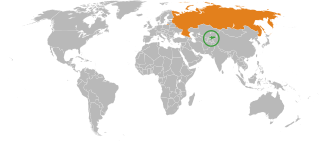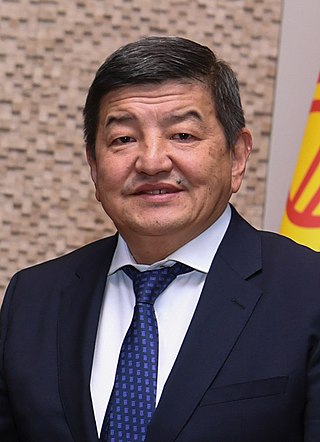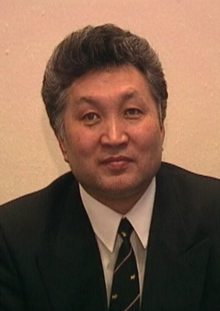
Bishkek, formerly known as Frunze, and before that Pishpek, is the capital and largest city of Kyrgyzstan. Bishkek is also the administrative centre of the Chüy Region. Bishkek is situated near the border with Kazakhstan and has a population of 1,074,075, as of 2021.

The history of the Kyrgyz people and the land now called Kyrgyzstan goes back more than 3,000 years. Although geographically isolated by its mountainous location, it had an important role as part of the historical Silk Road trade route. Turkic nomads, who trace their ancestry to many Turkic states such as the First and Second Turkic Khaganates, have inhabited the country throughout its history. In the 13th century, Kyrgyzstan was conquered by the Mongols; subsequently it regained independence but was invaded by Kalmyks, Manchus, and Uzbeks. In 1876, it became part of the Russian Empire, remaining in the USSR as the Kirghiz Soviet Socialist Republic after the Russian Revolution. Following Mikhael Gorbachev's democratic reforms in the USSR, in 1990 pro-independence candidate Askar Akayev was elected president of the SSR. On 31 August 1991, Kyrgyzstan declared independence from Moscow, and a democratic government was subsequently established.

The politics of Kyrgyzstan, officially known as the Kyrgyz Republic, takes place in the framework of a presidential system representative democratic republic, whereby the President is head of state and the Chairman of the Cabinet of Ministers is head of government. Executive power is exercised by the government. Legislative power is vested in both the government and parliament. The Economist Intelligence Unit rated Kyrgyzstan an "authoritarian regime" in 2022.

The Armed Forces of the Kyrgyz Republic is the national military of Kyrgyzstan. It was originally formed from the former Soviet forces of the Turkestan Military District stationed in newly independent Kyrgyzstan. It consists of the Ground Forces, the Air Force and the National Guard. Affiliated security forces to the armed forces included the Internal Troops, the State Committee for National Security and the Border Troops.

Kyrgyzstan, officially the Kyrgyz Republic, is a landlocked country in eastern Central Asia, lying in the Tian Shan and Pamir mountain ranges. Bishkek is the capital and largest city. Kyrgyzstan is bordered by Kazakhstan to the north, Uzbekistan to the west, Tajikistan to the south, and China to the east and southeast. Ethnic Kyrgyz make up the majority of the country's over 7 million people, followed by significant minorities of Uzbeks and Russians.

Askar Akayevich Akayev is a Kyrgyz politician who served as President of Kyrgyzstan from 1990 until being overthrown in the March 2005 Tulip Revolution.
The Kyrgyzstan national football team, officially recognised by FIFA and AFC as Kyrgyz Republic, represents Kyrgyzstan in international football and is controlled by the Kyrgyz Football Union, a member of the Asian Football Confederation (AFC) and Central Asian Football Association.

The som is the currency of Kyrgyzstan. It was introduced in May 1993 to replace the Soviet ruble after the dissolution of the Soviet Union. It is subdivided into 100 tıyın. Initially, only banknotes were issued, but coins were introduced in 2008. The currency features denominations ranging from 1 tıyın to 5000 som.

The Kirghiz Soviet Socialist Republic, also known as the Kyrgyz Soviet Socialist Republic, KySSR or Kirgiz Soviet Socialist Republic, was one of the constituent republics of the Soviet Union (USSR) from 1936 to 1991. It was also known by the names Kyrgyzstan and Soviet Kyrgyzstan in the Kyrgyz language, and as Kirghizia and Soviet Kirghizia in the Russian language. Landlocked and mountainous, it bordered Tajikistan and China to the south, Uzbekistan to the west and Kazakhstan to the north. The Kirghiz branch of the Communist Party of the Soviet Union governed the republic from 1936 until 1990.

Kyrgyzstan – United States relations are bilateral relations between Kyrgyzstan and the United States.

Kyrgyzstan–Russia relations are the relations between the two countries, Kyrgyzstan and Russia. Russia has an embassy in Bishkek and a consulate in Osh, and Kyrgyzstan has an embassy in Moscow, a consulate in Ekaterinburg, and a vice-consulate in Novosibirsk.
Almanbet Matubraimovich Matubraimov is a politician from Kyrgyzstan. In December 1993, he served briefly the acting Prime Minister of Kyrgyzstan. He took over from Tursunbek Chyngyshev. He served as the Chairman of the Assembly of People's Representatives from March 1995 to November 1997.

Azimzhan Askarov was a Kyrgyzstani political activist who founded the group Vozduh in 2002 to investigate police brutality. Of ethnic Uzbek descent, during the 2010 South Kyrgyzstan ethnic clashes, which primarily targeted people of the Uzbek nationality, Askarov worked to document the violence.

Alexander Sergeyevich Krestinin is a Russian professional football manager and a former player who is the manager of Uzbekistani club Bunyodkor. He is the former manager of Kyrgyzstan national team.
The following lists events that happened during 1942 in the Union of Soviet Socialist Republics.

The Kyrgyz Air Force is the official air force of the Armed Forces of the Kyrgyz Republic. Its current commander is Colonel Kylychbek Aidaraliev. The official holiday of the air forces is Aviation Day on August 18.

Sadyr Nurgojo uulu Japarov is a Kyrgyz politician who has been serving as the president of Kyrgyzstan since 28 January 2021. He previously held the post of acting prime minister of Kyrgyzstan in the 2020 interim government, following the resignation of President Sooronbay Jeenbekov. Japarov also became acting president of Kyrgyzstan after Jeenbekov's resignation, but resigned himself on 14 November 2020 to run for the 2021 presidential election, in which he was elected to succeed the acting president, Talant Mamytov.

Akylbek Üsönbek uulu Japarov is a Kyrgyz politician serving as Chairman of the Cabinet of Ministers of Kyrgyzstan since 12 October 2021. He replaced Ulukbek Maripov, who had been appointed to the new role by President Sadyr Japarov on 5 May 2021. Aqılbek is also concurrently the Head of the Presidential Administration under President Japarov.

The State Secretary or Secretary of State of the Kyrgyz Republic is an appointed post under the direct supervision of the President of Kyrgyzstan.


















